See also
- Recurring in-jokes in Private Eye
- Colourful racing identity
- Terminological inexactitude, a British parliamentary euphemism for lying
- Confirmed bachelor, a euphemism for homosexuality also coined by Private Eye
The phrase "tired and emotional" is a chiefly British euphemism for alcohol intoxication. It was popularised by the British satirical magazine Private Eye in 1967 after being used in a spoof diplomatic memo to describe the state of Labour cabinet minister George Brown, [1] but is now used as a stock phrase. The restraints of parliamentary language mean it is unacceptable in the House of Commons to accuse an MP of being drunk, but one may use this or other euphemisms such as "not quite himself" and "overwrought". The Guardian describes the phrase as having joined "those that are part of every journalist's vocabulary". [2] Because of this widespread interpretation, one source cautions professional British journalists against its use as, "even if the journalist meant it literally", it could be considered defamatory. [3]
In 1937, BBC commentator Thomas Woodrooffe had behaved so oddly on radio that he was suspended for a week; the BBC's official explanation was that he had been "tired and emotional", an excuse that was new at the time. [4]
According to legend, George Brown appeared on the BBC following the assassination of John F. Kennedy in 1963, and a BBC presenter subsequently described him as "tired and emotional". [1] In reality, Brown appeared on ITV, and although he was criticised for his apparent intoxication, [5] no evidence of the phrase being broadcast has been found. [1] It is also said to have its origin in a statement to the press by Brown's election agent, Edward Eldred, who made excuses for him after he had behaved badly in public by saying that he was "tired and emotional". [6] The phrase became associated with Brown, who already had a reputation for alcohol abuse. The Sunday Times wrote that "George Brown drunk is a better man than Harold Wilson sober", and The Independent said "Brown became a bit of a figure of fun, and, thanks to Private Eye's favourite euphemism for his regular condition, he bequeathed the English language the expression 'tired and emotional'." [5] The 1993 biography by journalist Peter Paterson, which included Brown's "fondness for the bottle", [7] was titled Tired and Emotional: The Life of Lord George Brown.
In 2002, Irish football analyst Eamon Dunphy appeared on RTÉ, the Republic of Ireland's state broadcaster, during its coverage of the 2002 World Cup, and was taken off-air during the programme and suspended. Dunphy subsequently apologised to viewers, saying, "I arrived for work tired and emotional, I think is the euphemism. And I was tired. I'd had a few drinks. I hadn't slept and I think wasn't fit to fulfil my contract." [8]
In 2004, Private Eye noted when The Sun newspaper, after an incident involving Prince Harry, then 20, attacking a member of the paparazzi following a night out at a London club quoted a "senior Clarence House source" as saying of Harry, "He'd been drinking and was tired and emotional." [9]
BBC foreign affairs correspondent John Simpson described the "erratic" Serbian politician Vuk Drašković as "tired and emotional" in a live news report from Belgrade broadcast on the UK evening news. He also used the term in relation to Drašković in a BBC news article entitled "Change in the air in Belgrade". [10]
The Wall Street Journal used the euphemism [11] in September 2010 to describe the Irish Taoiseach Brian Cowen after he was accused by Fine Gael politician Simon Coveney on Twitter of being "halfway between drunk and hung over" during an early morning radio interview. [12]

A euphemism is an innocuous word or expression used in place of one that is deemed offensive or suggests something unpleasant. Some euphemisms are intended to amuse, while others use bland, inoffensive terms for concepts that the user wishes to downplay. Euphemisms may be used to mask profanity or refer to topics some consider taboo such as disability, sex, excretion, or death in a polite way.
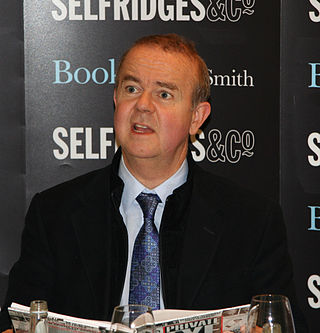
Ian David Hislop is a British journalist, satirist, and television personality. He is the editor of the satirical magazine Private Eye, a position he has held since 1986. He has appeared on numerous radio and television programmes and has been a team captain on the BBC satirical quiz show Have I Got News for You since its inception in 1990. Hislop has been involved in numerous legal battles, as Private Eye has often been sued for libel over the years. Despite these challenges, Hislop has remained a key figure in British satire and journalism.
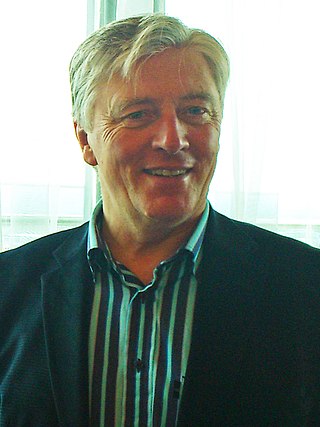
Patrick Kenny is an Irish broadcaster, who currently hosts the daily radio show The Pat Kenny Show on Newstalk and the current affairs show Pat Kenny Tonight on Virgin Media One.

George Alfred George-Brown, Baron George-Brown,, was a British Labour Party politician who served as Deputy Leader of the Labour Party from 1960 to 1970 and held several Cabinet roles under Prime Minister Harold Wilson, including Foreign Secretary and First Secretary of State.

Eamon Martin Dunphy is an Irish media personality, journalist, broadcaster, author, sports pundit and former professional footballer. He grew up playing football for several youth teams including Stella Maris. Since retiring from the sport, he has become recognisable to Irish television audiences as a football analyst during coverage of the Premier League, UEFA Champions League and international football on RTÉ.
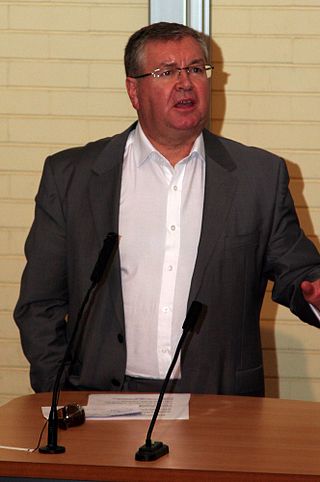
Joseph Duffy is an Irish radio and TV presenter employed by RTÉ. One of the public service broadcaster's highest-earning stars, he is the current presenter of Liveline, an interview and phone-in chat show broadcast on RTÉ Radio 1 on Mondays to Fridays between 13:45 and 15:00.
Parliaments and legislative bodies around the world impose certain rules and standards during debates. Tradition has evolved that there are words or phrases that are deemed inappropriate for use in the legislature whilst it is in session. In a Westminster system, this is called unparliamentary language and there are similar rules in other kinds of legislative systems. This includes, but is not limited to, the suggestion of dishonesty or the use of profanity. Most unacceptable is any insinuation that another member is dishonourable. So, for example, in the British House of Commons any direct reference to a member as lying is unacceptable, even if the allegation is substantively true. A conventional alternative, when necessary, is to complain of a "terminological inexactitude".
Après Match is an Irish comedy show normally screened after competitive Irish soccer matches on RTÉ. It is performed by Barry Murphy, Risteárd Cooper and Gary Cooke. It grew out of Barry Murphy and Risteárd Cooper's Frank's Euro Ting sketches which first enlivened RTÉ's coverage of Euro '96 for which the Republic of Ireland had failed to qualify.

Charles Brown Bird is an Irish journalist and broadcaster. He was Chief News Correspondent with RTÉ News until January 2009. He took up the role of Washington Correspondent, but prematurely returned to his earlier post in Ireland in June 2010. He retired from RTÉ in August 2012.
George Hamilton is an Irish broadcaster born in Belfast, Northern Ireland. He is best known as the chief football commentator for RTÉ, for which he also commentates on other sporting events, such as the Olympic Games. He presents a classical music programme on RTÉ lyric fm on Saturdays and Sundays called The Hamilton Scores.
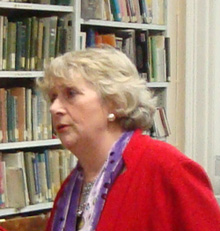
Mary Kenny is an Irish journalist, broadcaster and playwright. A founding member of the Irish Women's Liberation Movement, she was one of the country's first and foremost feminists, often contributes columns to the Irish Independent and has been described as "the grand dame of Irish journalism". She is based in England.
Audrey Carville is an Irish journalist. She is one of the presenters of Morning Ireland, a breakfast news programme on RTÉ Radio One. She previously presented the current affairs programme The Late Debate on the same station.
The fortnightly British satirical magazine Private Eye has long had a reputation for using euphemistic and irreverent substitute names and titles for people, groups and organisations and has coined a number of expressions to describe sex, drugs, alcohol and other aspects of human activity. Over the years these names and expressions have become in-jokes, used frequently in the magazine without explanation. Some have passed into general usage and can be found in other media and everyday conversation.
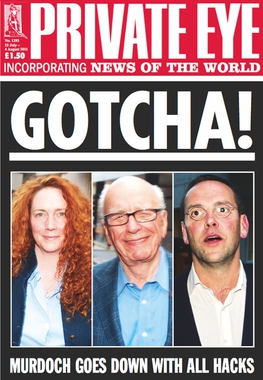
Private Eye is a British fortnightly satirical and current affairs news magazine, founded in 1961. It is published in London and has been edited by Ian Hislop since 1986. The publication is widely recognised for its prominent criticism and lampooning of public figures. It is also known for its in-depth investigative journalism into under-reported scandals and cover-ups.
The 47th season of The Late Late Show, the world's longest-running chat show, began on 5 September 2008 and concluded on 29 May 2009. It aired on RTÉ One each Friday evening from 21:30.
Tommie Gorman is a retired Irish journalist. He worked for RTÉ News from 1980 to 2021. He was the former Northern Ireland editor for RTÉ.

RTÉ broadcaster Gerry Ryan died on 30 April 2010, aged 53. Ryan had been presenting The Gerry Ryan Show since 1988 and at the time of his death had the largest audience on RTÉ 2fm. Ryan also hosted several television series, including Secrets, Gerry Ryan Tonight, Ryantown, Gerry Ryan's Hitlist and Operation Transformation and Ryan Confidential, as well as one edition of The Late Late Show in 2008. Ryan co-presented the Eurovision Song Contest 1994 with Cynthia Ní Mhurchú. He died sixteen years later at his Upper Leeson Street apartment in Dublin, with his body found by his partner Melanie Verwoerd. The broadcaster had split from his wife Morah in 2008; the couple had five children together.
The following is a list of events relating to television in Ireland from 2013.
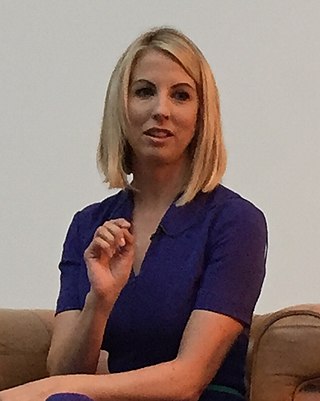
Caitríona Perry is an Irish journalist and presenter who works for BBC News as chief presenter based in Washington, D.C. She formerly worked for RTÉ, Ireland's national radio and television station, where she presented the Six One News from January 2018 to May 2023 and was the RTÉ News Washington correspondent from February 2013 to December 2017.
tired.and.emotional private.eye.